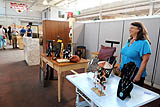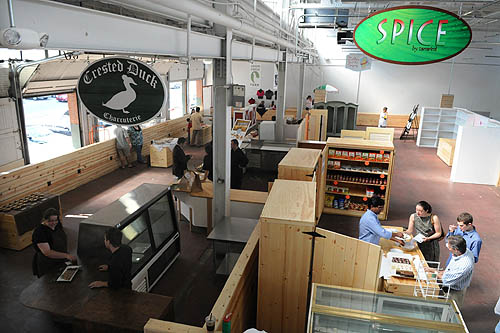
City’s Newest Indoor Market Opens in Strip Next Week
When the Pittsburgh Public Market in the Strip opens Friday, patrons will see some tried-and-true faces — La Prima Coffee, the Common Plea and Fudgie Wudgie among them.
But the new indoor market in the Produce Terminal Building on Smallman Street marks the retail debut of a number of the 43 vendors, whose wares will include organic produce, coffee, specialty meats, pastries, Indian food, pierogies, organic teas, local wines, micro brewed beer, skin care products, knitted goods and jewelry.
The Produce Terminal was built in 1926 by the Pennsylvania Railroad. The market house, located between 16th and 17th Streets, features horizontal roof-line skylights and doors that open for a river view. It will be open Fridays from 9 a.m. to 7 p.m., Saturdays from 9 a.m. to 5 p.m. and Sundays from 10 a.m. to 4 p.m. The grand opening festivities are Sept. 10-12.

Debbie Jacknin of Jenn's Jems displays her jewelry and other items in her booth at the new Pittsburgh Public Market in the Strip District on Tuesday. Robin Rombach/Post-Gazette
The project began almost nine years ago as a dream of Neighbors in the Strip.
“Eight years, three months and two days,” said Tom Goslin, the Market Council president and owner of American Dispatch.
The dream got state funding in 2005, the same year the Urban Redevelopment Authority, which owns the building, did a feasibility study. The URA invested $100,000. The total price tag of $1.25 million was filled out by federal, state and local foundation money.
“This was part of our neighborhood improvement strategy,” said Becky Rodgers, executive director of Neighbors in the Strip. “It’s been a goal of ours to bring back a piece of history to Pittsburgh.”
The city once had four enclosed marketplaces. The last of them closed in 1965 to create Allegheny Center Mall.
Several years ago, the board of Neighbors in the Strip visited existing markets: the Reading Terminal Market in Philadelphia, the West Side Market in Cleveland and the Central Market in Lancaster, hoping to bring a similar concept to the Strip.
Cindy Cassell, market manager, said the market council selected vendors “in the context of the entire Strip. We had a series of meetings with existing businesses and came up with a list of things that would contribute the most diversity to the Strip.”
Edith Davis and Eartha Sewell, of Edith and Eartha Textiles, are among several woman- and minority-owned businesses in the marketplace. They were in a knitting group, then started knitting together, specializing in scarves and wraps.
“People said they wanted to buy them” said Ms. Sewell, “so we thought we could make a business out of it. Then this opportunity came up. You know what they say: Do what you love.”
The first vendor’s space in the markethouse is Kevin and Adam Costa’s Crested Duck Charcuterie, where the brothers are opening their first specialty meat shop. Kevin was mentored by a chef during a stint in Cincinnati, “then I just played with it and tried things. I did vegan baking at a farmer’s market in Indianapolis” before returning home to Pittsburgh last year.
Debbie Jacknin’s 23-year-old daughter Jenn began making jewelry when she was 14. “She taught me,” said Ms. Jacknin. “We’ve done craft shows before but nothing like this,” their first retail presence — Jenn’s Jems.
“A friend told me about this marketplace. I had to submit a video. And they accepted us.”

